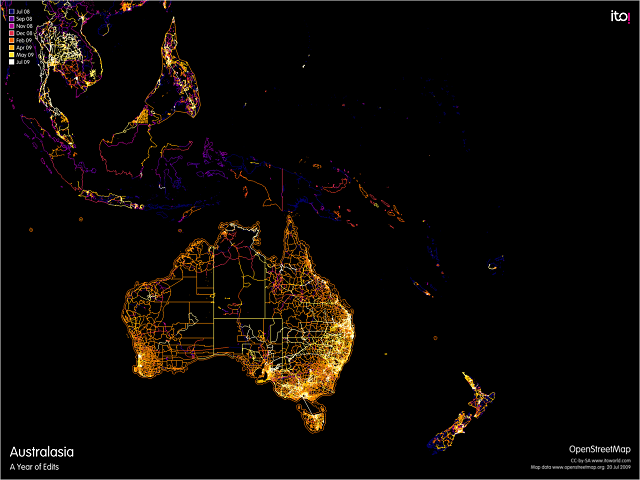Oz strategists: Paul Dibb
Posted By Graeme Dobell on July 25, 2016 @ 06:00

Starting as a geographer, Paul Dibb became one of Australia’s great strategists.
The discipline of geography is vital to the Dibb understanding of power, strategy and defence planning. For Dibb, geography disciplines strategy in the same way that you’re not discussing defence until you’re talking dollars.
In one of my first radio interviews with Paul—35 years ago—on the Soviet Union and the Baltic states, he sat with the atlas in his lap, summoning thoughts via his eyes and hands on the map.
Maps matter in the Dibb universe. And his understanding of Australia’s geography has profoundly shaped strategy. See Dibb’s key map representing ‘Australia’s regional security interests’ from the Dibb Report, the 1986 Review of Australia’s Defence Capabilities. [1]
This map has been the terrain for wars that have raged through Canberra for decades. The arguments can ascend towards the arcane, but big decisions and dollars and careers are in play.
In the conceptualising and understanding of Australian defence, Paul Dibb has been as important as the best defence ministers of his time. That means his impact has been more enduring than a lot of recent defence ministers.
Dibb is accused of geographic determinism. Others mean this as an insult. He embraces geography as the tool that orders much else, enabling Australia to tell the difference between broad interests and vital interests. Strategic geography is the iron discipline.
Key Dibb ideas (drawing strongly on his 1986 report):
- Australia’s ‘area of direct military interest’—10% of the globe—stretches east-west from New Zealand to the Cocos Islands, and north-south from Indonesia to the Southern Ocean.
- Australia’s ‘sphere of primary strategic interest’ encompasses Southeast Asia and the South Pacific
- A layered strategy of denial in the area of direct military interest
- The sea–air gap is the key to Defence of Australia because it’s ‘a formidable barrier for any enemy’. ‘Our most important defence planning concern is to ensure that an enemy would have substantial difficulty in crossing the sea and air gap.’
- Navy and Air Force get priority and the big bucks, while Army comes third
- Beyond the areas of direct and primary interest, Australia should ‘make a modest military contribution in support of our more distant diplomatic interests and the military efforts of others. But this should be seen essentially as a gesture of support… not as a contribution that could materially affect the outcome. Our forces shouldn’t be specifically structured or equipped to undertake such tasks.’
- Depending on what’s happening in Indonesia, the archipelago is Australia’s ‘arc of instability’ (as it was after Suharto fell) or, as it could be today, Australia’s ‘strategic shield’
- Australian defence self-reliance and the US alliance aren’t in conflict, but complementary. Australia alone couldn’t afford what the alliance offers in intelligence, weapons, logistics, science and technology. ‘But there’s no requirement for Australia to become involved in US contingency planning for global war.’
Canberra’s rolling Dibb wars are gathered in one volume, in the fine ANU tradition of honouring the vertical man rather than the horizontal man. The essays in honour of Paul Dibb, ‘Geography, Power, Strategy & Defence’ can be found for free here [2] and all the battles are recounted.
For Army, Dibb was a swear word. The counter-arguments were many: Dibb’s regionalism versus globalisation or Dibb’s geography-based defence of Australia versus the Army’s expeditionary tradition of going far afield in support of big allies. And what had Dibb’s geographic obsession to say of 9/11 and the George W. ‘war on terrorism’?
As Geoff Barker writes, the Dibb view is widely criticised ‘by those who support the creation of heavily armoured Australian expeditionary defence forces capable of deploying to distant theatres and aggressively supporting the US in contingency planning for global war.’
Kim Beazley says Dibb was a lightning rod for ‘brutal’ debates, but he made a significant contribution to Australia’s national defence: ‘His legacy remains real. It endures.’
One other bit of geography. Paul Dibb comes from a mining village in Yorkshire. In the definition and discovery of the strategic meaning of Oz geography, Captain James Cook [3] is the most important Yorkshireman; Dr P. Dibb, AO, is second.
From his time living in Yorkshire, Bill Bryson [4] concluded: ‘I’ve never understood why Yorkshire people have this terrible reputation for being mean-spirited and uncharitable. I’ve always found them to be decent and open, and if you want to know your shortcomings, you won’t find more helpful people anywhere.’
Dibb exactly—he still thinks a butty constitutes food. Using Yorkshire cricket as the template, Paul is Geoff Boycott in defence and Fred Trueman in attack. And in attack or defence, he delivers with a grin.
The Dibb characteristics described by Des Ball are, ‘the mateship, the bluntness, the outspokenness, the combativeness.’
If the stakes are important, the energy must match the strength of the logic.
He enjoys a fight as much as a feed—and he knows both work better with a glass in hand.
In the phrase ‘robust public debate’, Paul Dibb has all bases covered. The word ‘public’ matters.
For most of the 20th century, Oz defence was Top Secret Stuff—to talk was treachery. One of Paul Dibb’s many contributions to Oz strategy was to shred the ‘Secret Canberra Men’s Business’ conducted deep inside the Defence Department.
Dibb knows that strategy is both performance art and dark art. Much must be done—and explained—in the open, and Paul Dibb’s life as public servant and public intellectual has helped remake the role of the Oz strategist.
Article printed from The Strategist: https://aspistrategist.ru
URL to article: /oz-strategists-paul-dibb/
URLs in this post:
[1] Review of Australia’s Defence Capabilities.: http://www.defence.gov.au/SPI/publications/defreview/1986/Review-of-Australias-Defence-Capabilities-1986_Part1.pdf
[2] here: http://press.anu.edu.au/node/1838/download
[3] James Cook: http://adb.anu.edu.au/biography/cook-james-1917
[4] Bill Bryson: https://books.google.com.au/books/about/Notes_from_a_Small_Island.html?id=rTXB680gLl8C&redir_esc=y
Click here to print.